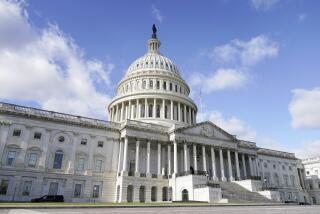House GOP weighs backing off default threat
WILLIAMSBURG, Va. – Backing away from the threat of default on the nation’s bills, House Republicans are considering a short-term increase in the legal ceiling on the national debt – possibly without demanding any spending cuts – while focusing on the other budget battles ahead.
The potential shift in strategy comes as Republicans are meeting privately at a posh retreat in Virginia, struggling to find a way forward after the bruising “fiscal cliff” fight with President Obama.
One idea emerging is to seek a series of short-term increases in the debt limit, starting next month. That would postpone the politically difficult debt ceiling fight so that Congress could focus attention on another battle: the mandatory federal spending cuts that kick in March 1.
In agreeing to raise the debt limit, Republicans would turn away from their past demands that the increase must be coupled with equivalent spending reductions – the dollar-per-dollar swap, as has been established by House Speaker John A. Boehner (R-Ohio).
Instead, Republicans may make other demands of Obama and Senate Democrats.
Among those under consideration: requiring the Senate to pass a budget.
A decision to avert a debt ceiling showdown is not certain. But the consideration of such a move comes as Republicans believe they have greater political leverage elsewhere.
“What we’ve been doing is facilitating a conversation about the best way to achieve progress on controlling our deficit and our debt – controlling our spending,” said Rep. Paul D. Ryan (R-Wis.), the former GOP vice presidential candidate and chairman of the Budget Committee, who led a discussion with rank-and-file lawmakers outlining the deadlines ahead.
The threat of the coming March cuts – which both parties have said they hope to avoid – provide an opportunity for the GOP to try to force Obama and Senate Democrats to consider alternative reductions elsewhere. Republicans have long sought to spare the Pentagon from cuts and shift the burden to other domestic programs, including Medicare and safety net programs.
But to get to that debate, Republicans must first dispatch with the need to raise the nation’s debt limit, which could come as soon as mid-February. The nation has already topped its $16.4-trillion limit and Congress will need to authorize more borrowing so that the nation can continue paying its bills.
Simply increasing the debt ceiling without extracting other GOP goals is unlikely; many rank-and-file Republicans would vote no, having won reelection by promising to cut spending and curb the debt.
But Obama is unlikely to agree to any deal that requires cuts for the debt increase, having repeatedly and forcefully insisted that he will not engage with Republicans as he did in 2011, when the nation came perilously close to defaulting on its obligations when Washington stalemated.
The lack of a formal budget from the Senate, where Democrats have the majority, has been particularly irksome to House Republicans, particularly rank-and-file conservatives who try to adhere strictly to legislative rules.
Forcing the Senate to “do its job,” as Republicans often say, would be politically popular.
Republicans are also considering other ideas, and lawmakers said House leadership was in a listening mode as they planned a path forward.
Twitter @LisaMascaroinDC
More to Read
Get the L.A. Times Politics newsletter
Deeply reported insights into legislation, politics and policy from Sacramento, Washington and beyond. In your inbox three times per week.
You may occasionally receive promotional content from the Los Angeles Times.







